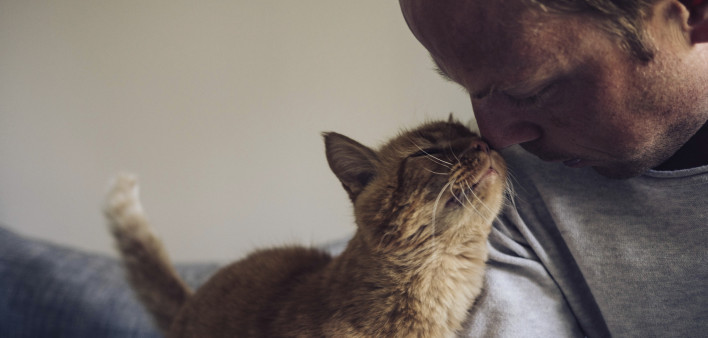Tim Horn • Asbury Park, New Jersey • Positive since 1993
I need a bigger home office. No matter what time I take to my computer to write and edit content for AIDSmeds.com [POZ’s sister site], I find myself jockeying for space, competing with two large dogs sleeping in the leg space under my desk and a cat forever plotting her next clumsy dance across my keyboard. Then again, I don’t know if I’d have it any other way. These are just some of my animals-in-residence that have enriched my life as a person living with HIV in ways I never thought imaginable.
When my partner, Peter, and I tell friends and colleagues about the various pets at our home in Asbury Park, New Jersey, it’s not uncommon for us to be met with blank stares. On more than one occasion, we’ve been dubbed the Jersey Shore equivalent of Big and Little Edie of Grey Gardens fame, albeit without the Bouvier pedigree and, fortunately, the destitution and filth (at least not yet). We have our two boxers, Buster and Lucy; our cat, Feral Fawcett; a 250-gallon tank full of tropical fish; and until recently, an African grey parrot and a yellow-collared macaw. We’ve taken in other animals along the way, including a 16-year-old English sheep dog with a long list of health problems and several amphibians. We have no aversion to adopting others when the time is right.
Maintaining a small zoo wouldn’t have gone over well with my first HIV doctor when I was diagnosed in the early 1990s—he told me to rid my residence of anything that barked, meowed, flew or swam. Though I considered his recommendation to be a tad excessive, I understood where he was coming from.
In the early years of the HIV epidemic, immune suppression was all but certain. In turn, many people living with HIV were frequently instructed to safeguard against domestic threats of critter-carrying infections—bartonellosis, cryptosporidiosis, toxoplasmosis and Mycobacterium avium complex (MAC), to name a few—then known to be potential death sentences for those with AIDS.
With today’s highly effective combinations of HIV drugs, many of us no longer need to think of our animal companions as potential biohazards. That’s good news for the estimated 400,000 HIV-positive pet owners in the United States who will gladly point out that the health risks posed by animals can’t possibly compete with the immeasurable physical and mental health benefits that come from human-animal bonds.
Only recently have I familiarized myself with the reams of scientific data underscoring the health benefits associated with animal interaction—the results are astounding. Dog owners are more likely to live longer after a heart attack compared with those without canine companions, according to a 1995 study. Dog ownership also reduces blood pressure to the same extent as a low-sodium diet and decreased alcohol consumption. Cholesterol and triglyceride levels are also reduced among people with pets.
Interacting with dogs also has been shown to enhance levels of the hormones dopamine and endorphins—both associated with happiness and well-being—and to reduce levels of the stress hormone cortisol. Minor health problems also become less common after acquiring a dog. And don’t forget that elderly individuals who require fewer doctor visits and medications if they own a dog compared with those who don’t.
Other studies affirm the positive effects of pets on psychological well-being, notably among people living with HIV. In one study, HIV-positive people reported that their pets provided companionship and support, reduced stress and provided a sense of purpose. In another, people living with HIV said that their cats were an integral part of a support system to prevent loneliness. Our pets force us outside, for walks or trips to the pet food store, giving us a purpose and a chance to interact with the world, which in themselves can be powerful antidotes to depression. Another study found that many people living with HIV, notably those with few human confidants, were significantly less likely to become depressed compared with those who did not have pets.
Yet these studies barely begin to capture the unique and multifaceted connections we have with our pets. Indeed, the comfort pets provide during difficult times—possibly because of their unexplainable gift of intuition, or because they haven’t yet evolved to say “snap out of it”—can sometimes exceed the support we seek from fellow humans. Our friends and family may push for explanations for why we are blue or down when we are ill-prepared to verbalize them, or they may provide well-intentioned but ultimately unhelpful anecdotes when trying to commiserate, or they may offer sympathy that rings hollow or patronizing… when all that’s needed is a little play time in the back yard or a loving nudge from a cold, wet nose.
After a particularly rough day of work or the stress of a doctor’s appointment, I’ll sit hypnotized in front of one of our aquariums, watching delicate fins and translucent bodies move through a world where everything is fluid. The electric colors of our cichlids, gourami and barbs are vibrant and uplifting; the trickling water and the gentle white noise of the filter are soothing.
On days I’m feeling crushed emotionally or physically, there’s no better reprieve than taking a short nap next to a snoozing pooch or to the sound of gentle purring cadence. And when I just need a break—from the anxiety and monotony of a frustrating world made even more distressing by HIV—a romp on the beach with Buster and Lucy serves as a much-needed emotional pick-me-up.
Finally, while it is people who do much of the teaching in domestic human-animal relationships, it is equally true that we have much to learn from our pets, notably their perseverance in the face of adversity.
Lucy, our eldest boxer, has been receiving daily chemotherapy for malignant lung tumors and is becoming arthritic. Her time is nearing, and it’s breaking my heart. Yet she moves forward with her day—complete with bouts of playfulness, inconvenient siestas under my desk and not-so-subtle reminders that it’s time for a treat—and she does so with the joy and exuberance of a puppy. Lucy is not afraid. She continues to live each of her days, however many more she may have, to the best of her ability, without the shame, hand-wringing and needless drama that occupy so much of the precious time we have. I envy her for that and am inspired by her.
Brian Davis • Roopville, Georgia • Positive since 1990
I was 18 years old when I was diagnosed with HIV. Slope, my little bobtail kitty, kept me from going through with suicide in 2006 a few months after I was diagnosed with AIDS. My pets are the only children I will ever have.
Friends disappeared and family turned against me when I got my AIDS diagnosis. I witnessed three AIDS-related deaths when I was 18 years old. They made one hell of an impression on my young mind. I swore I would never go out like that.
I sat down on the couch one day ready to end it when Slope crawled up in my lap and pressed his head to my chin. It melted my heart. I had to stick around to take care of him and his sister. It was the only sign I felt of being loved after my AIDS diagnosis until I met my wife through your awesome POZ Personals.
I do believe pets can often be the best medicine. My wife and I rescue as many animals as we can and now have nine kitties and a dog. Pets saved my life—literally.
Dab Garner • Jacksonville, Florida • Positive since 1982
Being a national activist for the HIV/AIDS community and doing holiday parties for thousands of children with HIV and AIDS around the world can be stressful and hectic. My dogs help keep me grounded and provide me with unconditional love. I now have three dogs I rescued from animal control. Each was one day from being put down.
Chipper, now 16, is a deaf and blind long-haired Chihuahua whose owner had died of AIDS-related illness. Animal control considered him not adoptable because of his disabilities and advanced age (he was 12 at the time). I rescued Chipper four years ago, and he is my shadow following me around the house and loves sitting on my lap for hours each day.
Sugar, now 8, is a Maltese mix, who was brutally abused and then abandoned. Last but not least is Harley, now 7, a miniature schnauzer, who was abused as a puppy by a small child.
Being a long-term survivor, I have ups and downs with my health care like anyone dealing with HIV and AIDS. However, Harley, Sugar and Chipper never care about what I look like. They keep me going through the rough times. Even when I feel like shutting out the world, they encourage me to get out if only to take them for their walks.
I encourage anyone living with HIV and AIDS to adopt a pet. Go to your local animal control or an organization like Pet Project in the Fort Lauderdale area, which helps people with HIV and AIDS take care of their pets. Unconditional love can make even the worst day a little brighter.
Christopher Mundy • Boston • Positive since 2006
For my 13th birthday, my mom promised me a parrot. On my birthday, we visited the home of a woman who was giving away her birds because they had started to clash with her daughter. She wanted her pets to go to a good home.
We were shown two birdcages, one stacked on top of the other. In the lower one was a large white umbrella cockatoo, a white angel. In the top one was a white-capped pionus parrot, a little blue-green bird with a white cap on his head.
Mom told the lady that she would take the umbrella cockatoo and wrote a check. While still holding the check, the lady looked over at the little blue-green bird clinging to my chest. She saw the bird was attached to me, so she offered it at no additional charge.
I had been taking care of parrots for five years by then, but I still listened as the lady gave us basic instructions on bird care. We named my mom’s bird Lolla and my bird Cisco.
They became our sentinels for two decades. They watched as my mother’s other birds died from various accidents, and they watched as Mom grew ill. They gave her love until cancer made her too weak to care for them. I volunteered to take them. That was seven years ago.
Parrots are a reminder of how fragile life is. They are a wondrous creation that can outlive a human life, yet they are susceptible to things that we tolerate without notice.
Lolla and Cisco have been joined by a young Congo African grey named Elliot. My flock has comforted me all these years. Their feathers have soaked up my tears of happiness and sorrow from boyhood to adulthood. It was into Lolla’s feathers I cried when I found out I was HIV positive and when cancer took Mom.
Lolla passed away recently. Her wings gave my heart flight when all else was lost. She added to me a part of her soul. The memory of Lolla’s love gives my heart hope.
Kristin McClure • Alpharetta, Georgia • Positive since 2008
I never had my own dog up until a few months ago, even though I have always been a huge fan of animals. My first job was working as a kennel assistant in an animal hospital, which I continued for almost six years. It meant a lot to me every day I was there.
After being diagnosed with HIV, I went through a hard time emotionally. I remember falling into the foulest mood I think I’ve ever been in, and nothing seemed to make me feel better. I tried to get out of that horrible funk, but it wasn’t budging an inch.
I came home one day from work, and my roommate told me to come open the door for her because she had some things in her hands and needed help. It turned out what she had in her hands was a 3-pound miniature dachshund puppy. My heart melted. I was so in love with him. Later on that night, we decided to name him Cash.
Animals do so much for people on both a mental and emotional level. They have made my health so much better. Of course, not everything is better because I got a dog, but I have found myself again. I have been given a reason to make life work and to make the best of it. I have Cash and my roommate to thank for that.
Ted LeBlond • Pawtucket, Rhode Island • Positive since 2004
Max, my 11-year-old beagle, does more than contribute in a positive way to my health—she is the reason I am still alive today. We have been together since she was 8 weeks old.
During that time, there have been countless moments when simply by petting or playing with her, I felt my mood improve. She shows me unconditional love, which helps me counter depressive symptoms.
During some dark times when I contemplated suicide, I would look down at her and ask myself: Who would take care of her? Where would she go? I couldn’t take my life while she depended on me for everything from food to companionship.
Having to walk her gets me out of the house and gets me fresh air and exercise. I don’t feel so alone with her around.
Michael Bivens • Fort Mill, South Carolina • Positive since 1992
Randy, my first long-term partner, gave me Appollonia, a cocker spaniel. The following year, we moved from North Carolina back to his home state of Ohio and opened a pet store. For many years, we ran our shop and bred a line of cocker spaniels.
Randy passed away of AIDS-related illness in 1994. About four months before he died, one of the dogs we had sold was having pups and we were offered one. My partner wanted a puppy so badly, but I wasn’t so certain. But how was I supposed to tell the man I loved, a dying man, that he couldn’t have a puppy? I couldn’t.
Two years after my partner passed away, I became gravely ill with Pneumocystis carinii pneumonia (PCP) and was hospitalized. I checked myself out of the hospital to be with my dogs at the end, just as my partner had done. But I didn’t die, and I have to give part of the credit to my cocker spaniels.
At least once a day, barely recovering from PCP, I had to struggle into the kitchen to feed and water the dogs. Since I was already in the kitchen, I also prepared myself some food. If I hadn’t had the responsibility to care for those dogs, I could have easily succumbed to sickness, grief and depression. I’m sure I would have died.
As the HIV meds improved, so did my health. As those cocker spaniels passed away, I continued to get more of them from the same line. Things were so good in my life that I even fell in love with Jim, my second long-term partner.
However, things never stay the same. Jim passed away of AIDS-related illness in 2008. I also ran into serious financial trouble, losing my car and our home. However, I still had a responsibility to my dogs. I now had three boys—Joxer, Aries and Zeus—the great-great-grandsons to my first spaniel.
Thankfully, I got the opportunity to move back to the Carolinas to live with my family again. My three boys and I said goodbye to Ohio and left behind, resting in peace, my two partners, Randy and Jim, and eight members of our canine family—Appollonia, Electra, LBB, Eightball, Onyx, Hershey, Triumph and Gabrielle.
Every day, at least one of my dogs has made me laugh. Whenever I have felt alone and couldn’t hold back the tears about my lost partners, a dog (or two or three) has always been there to share some of the sorrow. It’s never been a burden to care for them, because they gave me a reason to care for myself.
Luise Bertelsen • Soro, Denmark • Positive since 2008
I got my dog Molly about one year after I was diagnosed with HIV. At that time, I had just moved back to Denmark, my home country, after living in South Africa for a year and a half. I was depressed, so a friend advised me to get a dog.
I searched animal rescue centers online and fell for a description of Molly. I immediately went to see her. We clicked, so I went back the next day to bring her home. Since then, the quality of my life has just gone up.
Molly is a mixed breed dog, but she fills my heart with love and laughter. She sleeps next to me in my bed and keeps me warm in the cold winter nights. Now I love to go for long walks, but I didn’t before I got her. She keeps me healthy. No matter how low or alone I may feel, I know that Molly will always love me.
Don’t have a pet? Don’t worry...
You can still enjoy the health benefits of animals:
- Volunteer to be a host home for a seeing eye or therapy puppy
- Rescue an animal from your local animal shelter
- Offer to dog or cat sit for friends when they travel
- Ask friends to come visit you with their pets
- Volunteer at a local animal shelter or animal therapy organization
Allergic to animals?
Consider choosing furless or featherless pets such as fish, reptiles or amphibians. Turtles need love too.
Not perked by pets?
Sometimes, HIV gets us so far down that even our best animal friends can’t make us smile. Connecting with others who have endured or who are experiencing mental health issues can be another wonderful way to bolster your health and happiness. Want to know if you need professional help for mental health issues, or want to connect with others who are also feeling blue?
Go to smartandstrong.com/healthymind and take a quiz to see whether you need more than a cuddly creature to cheer you up!







5 Comments
5 Comments